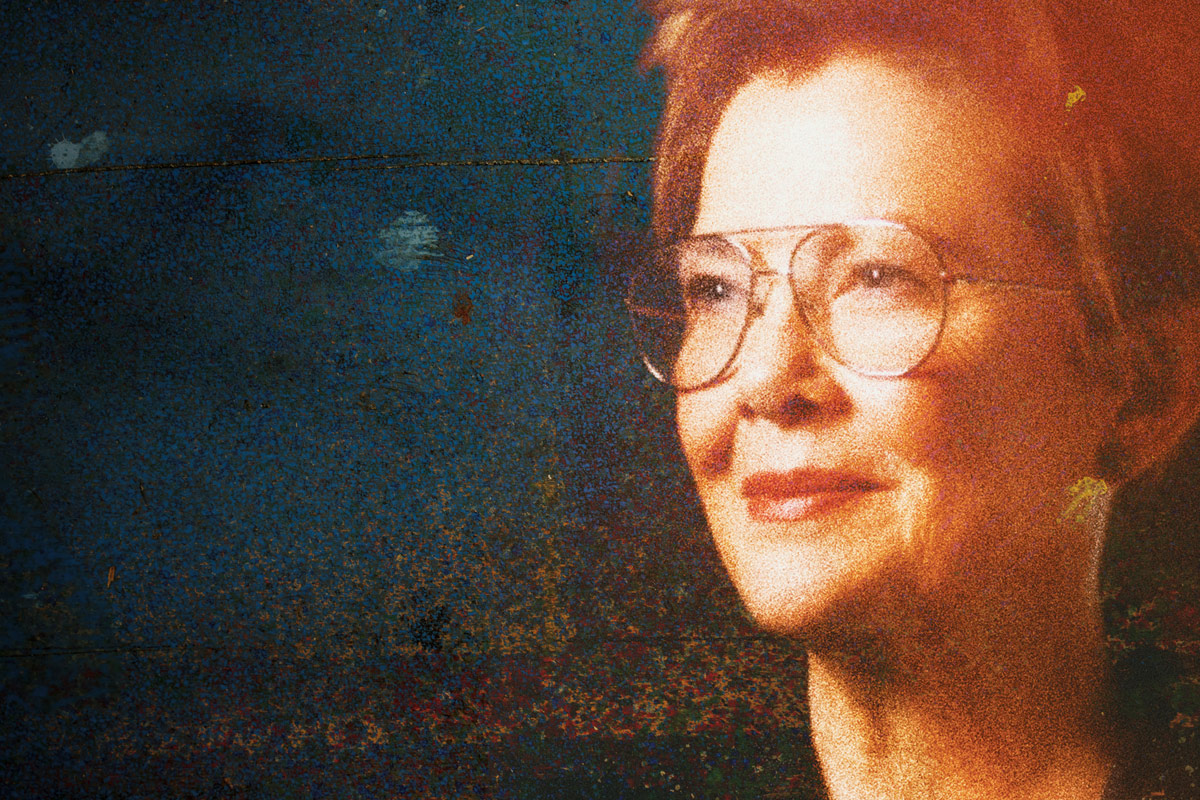
Photo by JSquared Photography/Contour by Getty Images
Being Bening
By Ben Fong-Torres
Wiki can be wicked. In its entry for Annette Bening (B.A., ’80), she is credited with nominations for two Golden Globe Awards, five Academy Awards and two Tony Awards. This, Wikipedia says, makes her “one of few artists nominated for the Triple Crown of Acting without winning.”
Sez you. Bening absolutely is a winner, her credits ranging from “The Grifters” (1990) through “Nyad” (2023). Both performances drew Oscar nominations. In between, there were “American Beauty” (1999), “Being Julia” (2004) and “The Kids Are All Right” (2010). Sprinkled in there were Tony nominations (for “Coastal Disturbances” and “All My Sons”) and, oh, yes, four children with her husband since 1992, one Warren Beatty.
That is one winning life portfolio. And it began, she is happy to say, at SF State, which has celebrated her as an Alumni Hall of Famer, an Alumna of the Year, a President’s Medal recipient, a Commencement speaker and an honorary Doctor of Fine Arts.
We began our conversation — she at home in Los Angeles a few days after wrapping her latest movie — by Zoom. As we began, she asked about my backdrop of book and CD shelves. I should’ve asked about a sign on the wall behind her. The part I could make out read: “WANTED EVERYWHERE.” That well could describe Annette as well as any Wikipedia entry.
We both won honorary doctorates in fine arts from SF State. I’m a Benny come lately, though: I only got mine last year, and you’ve had yours since 2015. What did that mean to you — becoming an honorary doctor?
It was a thrill. I feel very honored. I’m really proud of my time there. … I was lucky to go to San Francisco State. I loved it. It was a great adventure for me: the first place I lived outside of my hometown. So getting the doctorate was like a beautiful gift.
When you were deciding to come to San Francisco, had you done some research on SF State or other colleges and universities here? In regards to theatre, for example?
A little bit, not much. I knew I wanted to study theatre, and what I remember learning was that [SF State] had a big department and lots to do and lots of activities, lots of productions and classes as well as all the other classes I was interested in taking in addition to the major. A lot of it was geographic. I really wanted to live there and I wanted to be in a city environment. So it was perfect.
It was at SF State, I think, where you said, “I want to be a classical theatre actress.” Had you also become a fan of movies? Or were you really looking at the stage as your favorite environment?
Yeah, I really was looking at the stage. I didn’t start imagining myself in movies until later. And movies weren’t my passion really. The stage was my passion. Language, dramatic literature, the sound of the human voice, the energy of being in a room with people and watching something, and then also being up on the stage performing. The athleticism of it, the demands of it emotionally, spiritually, intellectually. Just on every level it taxes and demands everything of you. And I just fell in love with that.
Were there professors who were particularly inspiring or influential to you?
I would say Tom Tyrrell, who was my main acting professor and director. He was a very large guy, with white hair and a kind of deep, growly voice, and he loved the theatre. He loved to direct, loved to teach acting. … He was very supportive of me and encouraging, and I felt like he saw something in me that made me feel like, “Oh, well, maybe I have something to offer.” I thought he was a great teacher.
There was another professor named Robert Graham, Bob Graham, who did all kinds of stuff. He did technical stuff, and he also taught. And we ended up talking a lot about Zen somehow. We got way into talking about Buddhism and Zen, and I loved him, and I loved his class. Alex Flett was our history teacher. I loved theatre history. And I think the idea of this particular activity stretching back into the beginning of recorded time, that this is something [people] have always done. We’ve gotten into rooms together and made up stories to tell each other about ourselves. I just find that endlessly interesting.
Alex Flett was once quoted as saying that he appreciated your drive and determination to succeed — that nothing was going to stop you. Did you really feel that level of confidence at the time?
I think that I had an innate passion for the work. Though I think that with confidence always comes insecurity and doubt. I don’t know. Maybe there are people that just have confidence. But I think most people that have confidence have a tremendous amount of awareness of risk and fear. I still read a lot about that subject, especially in terms of artistic challenges, but not just artistic. I’m not saying anything original here.
Any kind of a challenge or going out on the end of a limb or the diving board before you jump in, you’re afraid. It’s not a question of not having fear. It’s a question of having fear and just doing it anyway. And I’ve learned over the years now when I’m afraid, which I often am when I’m working, I just say to myself, “I’m scared. This is making me nervous. I wonder what will happen.” So you know it might not work out. …
But I just loved it, and I loved the theatre, and I loved the work. I love the camaraderie. And so I just kept taking the next step. [The journey] wasn’t anything fancy. It was community college then San Francisco State. Go out for the plays. “Oh, I’m getting some plays? OK. They’re casting me? OK. I’ll just keep going.”
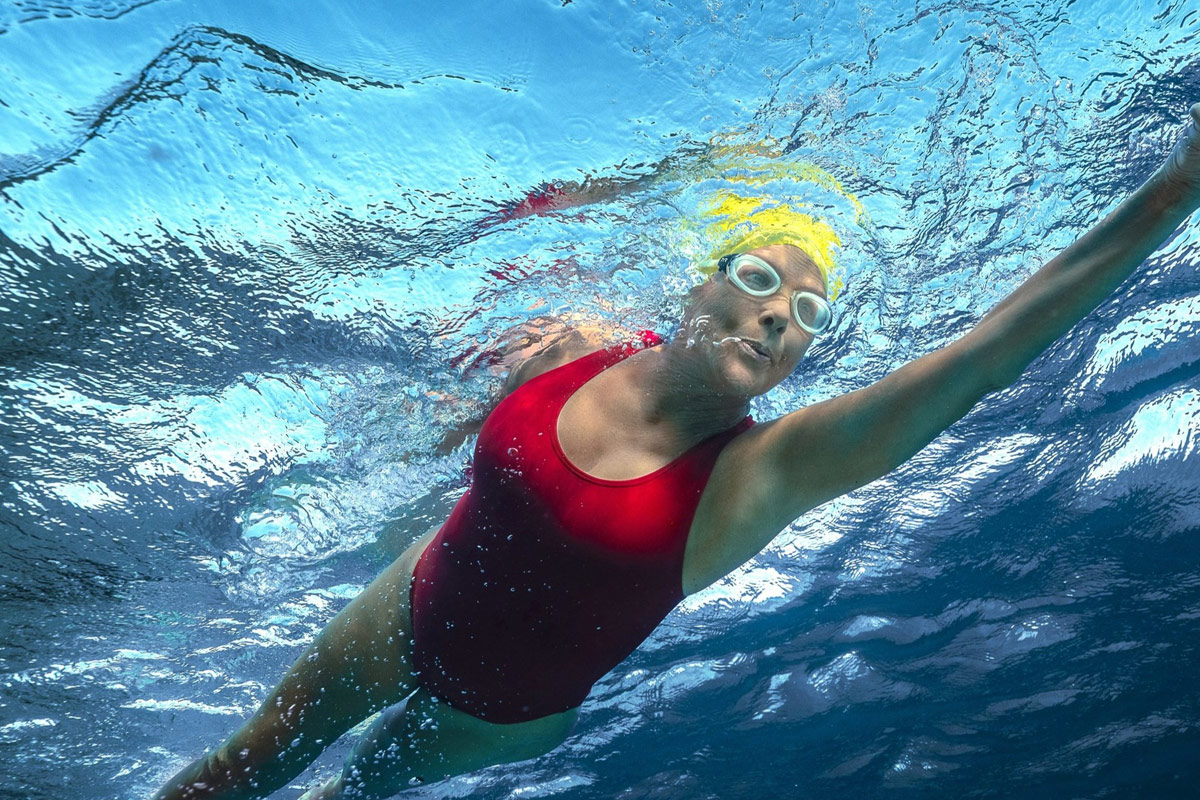
Photo by Liz Parkinson/Netflix
Even though you’re a veteran actor now, you continue to learn from probably every role you take. I saw an “Actors on Actors” visit with Julianne Moore [produced by Variety], and I think you said something about how the role of [Diana] Nyad, especially as you got into it and learned what you’d dived into, taught you about embracing being scared. Were there other life lessons you took from doing “Nyad”?
Yes, there were many. I just read a wonderful interview with Sophia Loren, who’s 90, and she was talking about how much she loved to still live and learn, and that one of the things that she enjoys so much is meeting new people. And it is so true, isn’t it, about life? It’s an endless parade of new people to meet out there.
With “Nyad,” I read the script, and it was such a powerful story. The narrative was so involving, and I had heard about Diana a little bit, but I didn’t know the story that well. I was so moved by it that I just immediately said, “Oh, I have to do this. Of course, I’m going to do this!” And then I started to think about it and realized, “Oh, my god! Like, wait! I have to be in a bathing suit, and I have to swim.” And I hadn’t really thought that through, which is kind of crazy. But I hadn’t. And yes, I had a few days in the pool when I thought, “What am I thinking? This is crazy!” I’ve never really been a swimmer. I love being in the water, and I was a diver and everything. But I was never a competitive swimmer or really knew that sport. I just kept at it and I put my mind to it, and there were a lot of ups and downs within that process for me personally. But I fell in love with it. …
A great challenge is, in a way, what we all still yearn for. There’s always part of me that wants to just sit and read a book and pet my dog and do nothing. And then there’s a part of me that wants to go on adventures and do things that are new and changing all the time. I have an equal part laziness and an equal part sense of adventure.
I’ve interviewed a lot of rock musicians and other musicians, and quite often they will say, “Oh, I can never listen to myself on record. I hide my albums from visitors. I don’t ever want to hear myself sing, because I’m not that good.” They have self-doubt, despite their reaching pinnacles of success. You’re not that kind of a person. You’re at ease with yourself.
No, I have that [self-doubt], too. I’ve learned to live with it, and I’ve learned to watch myself, because I think there’s a lot to be learned from watching myself. Usually I learned that I was worried about something I didn’t need to worry about, or I could have done it simpler. That's often what I see when I see myself. So yeah — I am very critical. And I’ve gotten better over the years about that. But I’ve had crushing self-criticism in the past, and it is hard to watch yourself, especially when you’re not used to it. And I certainly wasn’t used to it at first because I’d only been on the stage, and I’d never seen my face when I emoted. I’d never seen what it looked like if I laughed or cried or did whatever. And so yeah — just like when you hear your own voice on a recording, it’s like, “Whoa! What’s that? Is that my voice? Wow!”
You told Julianne Moore that in one of her films — it may have been “May December”— “You didn’t seem like you were performing.” I was wondering if you can evaluate your own work the same way.
Oh, I would love to be able to say that about my own work. I don’t know if I can. Maybe moments here and there. The fact is there’s a lot of things I probably could make better if I had the chance to go back and do it again. Sometimes I watch something, and I think, “That’s great just as it is. Just great.” And then much of the time I’ll think, “Oh, if you just put your face a little bit more in that direction it would have been better when he came in. You could have turned and seen him.” Or something small like that. Technical, really. But I try to quiet that voice. I think if there’s anything that not only as human beings, obviously in general, but certainly in our profession that we have to learn to cope with, it is the inner critic.
If you can possibly find a way to make friends with that inner critic and just say, “OK, now, quiet down. For now I need to do my work. Yes, I know. I know you’re there, and I know you’re seeding seeds of doubt and fear and self-criticism, self-abnegation, whatever. Just for now I’m going to let that go.” And every once in a while you do find that. And you find that moment of freedom internally. And in the moment, as you’re doing what you’re doing, you are finding that freedom and you are immersed, and it’s a wonderful gift.
It’s probably the thing that brings people back to the profession more than anything: those few little moments where you’re freed of yourself. You’re freed of all of the bounds that you know we feel in life. The things that bind us. And suddenly we’re just using our imagination and our bodies and ourselves and our souls and our minds and our hearts to try to reach out and touch another person, make them laugh, make them cry, make them disgusted, make them interested, make them curious, make them feel. Just feel.
Features
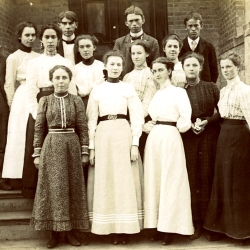
125 Years of SF State Excellence
SF State’s motto translates to “experience teaches,” so after a century and a quarter we’ve got a lot of fun facts to school you about.
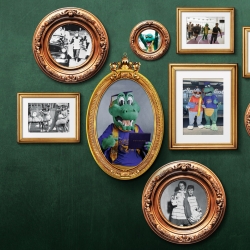
I, Alli Gator
Learn the evolution of a reptile that has become synonymous with SF State, as written in your fabulous Gator mascot’s journals over the years.
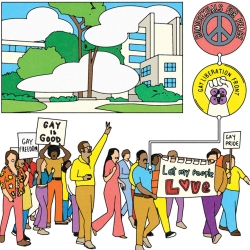
Strike Sparks
Gator heroes of the LGBTQ liberation movement are receiving long-due recognition courtesy of research by an SF State professor and his students.